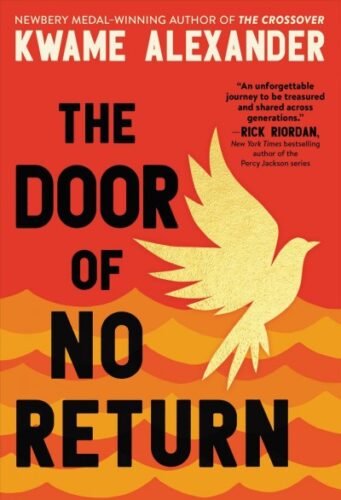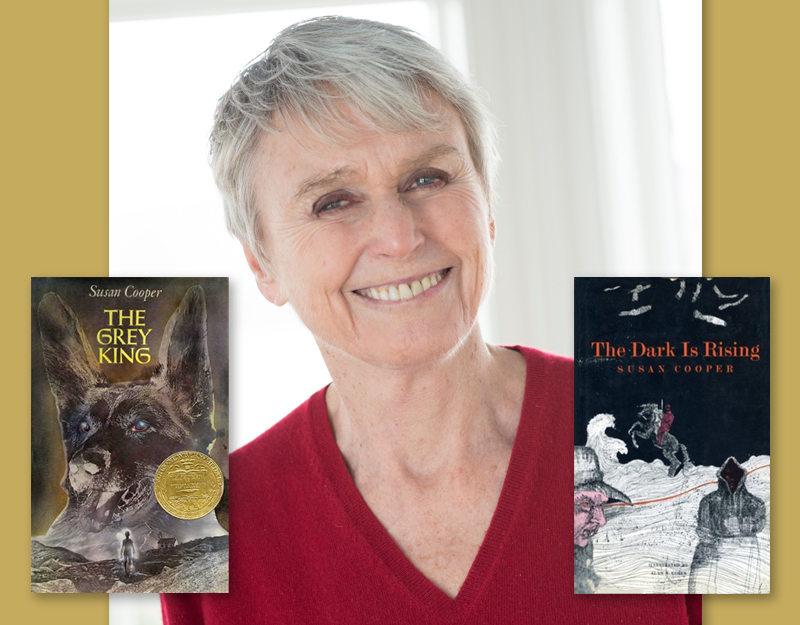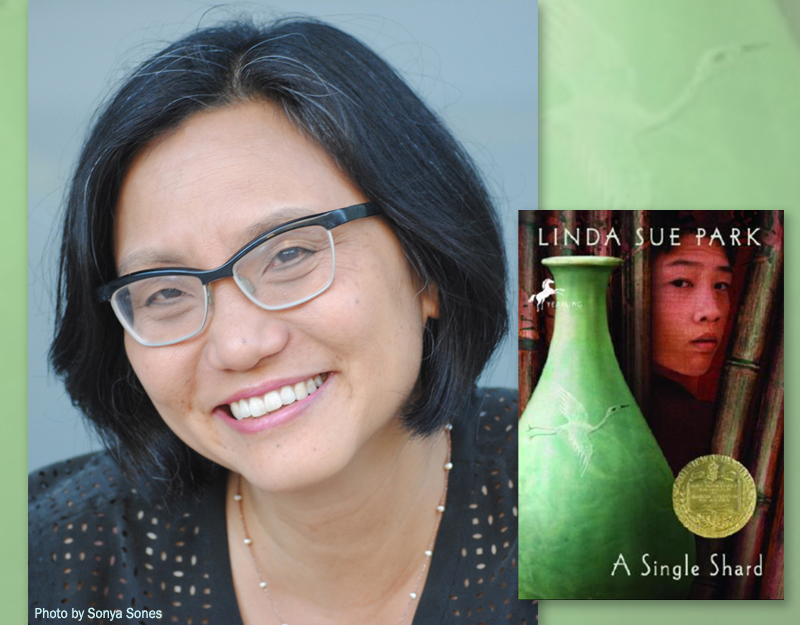Heavy Medal Mock Newbery Finalist: THE DOOR OF NO RETURN by Kwame Alexander
Introduction by Heavy Medal Award Committee Member Louie Lauer

In his acknowledgements, author Kwame Alexander explains that he wrote THE DOOR OF NO RETURN “because people need to know that the middle was not our beginning. I wanted to speak the truth about the history of African Americans, because while most of us are aware of the American part, it’s time for us to know more about the African part, right?” (402) With unflinching honesty, THE DOOR OF NO RETURN provides readers with this look into life on the African continent, as well as a harrowing account of how slavery took that life away.
Set in modern-day Ghana, Alexander creates a fictitious set of villages in 1860. Readers are immersed in this setting through both poetry and prose, the former from the perspective of a boy named Kofi, and the latter in the voice of his grandfather, Nana Mosi. The most striking element of Alexander’s world building is the emphasis on cultural background. Readers get a strong sense of the importance of a storyteller to a community, as well the centrality of water to their daily life. We also get a glimpse into family structure, with special attention paid to cross-generational relationships. Readers also see the impact of Imperialism that is already putting immense pressure on them to turn their backs on their language and their culture. These pieces of cultural information are central to Alexander’s purpose and show readers what life was like prior to slavery.
ADVERTISEMENT
ADVERTISEMENT
Storytelling as a means for passing along history and culture is central to this story and is expertly woven throughout the narrative. By placing Nana Mosi’s stories at the beginning of each chapter, Alexander highlights the importance of these stories, as well as storytelling in general. We also see the impact that storytelling has through the stories of Nana Mosi and Kosi. Most importantly, we see how important the storyteller is at framing the story. Throughout history, these chapters of the African American story have been mostly omitted. Alexander reminds his readers not only what life was like for African people prior to slavery, but also that it does matter who is telling the story. Or as Nana Mosi says so eloquently, “until the lions tell their side of the story, the tale of the hunt will always celebrate the hunter” (342).
With all of this emphasis on storytelling, it is important not to forget Alexander’s ability to construct narrative here. The poetry, by utilizing sensory language and a first person perspective, makes the reader feel as if they are in the middle of the action. Even with such important thematic material, this is a book that reads at times like an adventure novel. The action is often jarring and surprising, especially as Kofi and others are kidnapped from their families and sold into slavery. With the feel of an epic, and two more installments promised, this is one of those books that isn’t just important for all readers, but is one readers will want to get their hands on.
Heavy Medal Award Committee members and others are now invited to discuss this book further in the Comments section below. Please start with positive observations first; stick to positives until at least three comments have been posted or we reach 1:00 pm EST. Let the Mock Newbery discussion begin!
Filed under: Book Discussion, Heavy Medal Mock
About Steven Engelfried
Steven Engelfried retired from full-time library work a couple years ago and now works as a part-time Youth Librarian at the West Linn Public Library in Oregon. He served on the 2010 Newbery committee, chaired the 2013 Newbery Committee, and also served on the 2002 Caldecott committee. You can reach him at sengelfried@yahoo.com.
ADVERTISEMENT
ADVERTISEMENT
SLJ Blog Network
Should I make it holographic? Let’s make it holographic: a JUST ONE WAVE preorder gift for you
Press Release Fun: Happy Inaugural We Need Diverse Books Day!
Halfway There: A Graphic Memoir of Self Discovery | Review
When Book Bans are a Form of Discrimination, What is the Path to Justice?
RA Tool of the Week: Inside Out Inspired Emotions, but Make it YA Books
ADVERTISEMENT








What a powerful book and a great introduction from Louie! Students will be drawn to it who have read Kwame Alexander’s Booked and Crossover but may be shocked to discover a much more “jarring and surprising”(as Louie stated) adventure. I agree the theme is so well done. The theme of survival is an important one. There is the survival of their Asante culture-their language, their stories, their food, their way of life. You can see in the exchanges with Dr. Goodluck Phillip that they are trying to erase their language. Kofi got in trouble for answering in his native language of Twi. Will their culture survive through storytelling? And then their actual physical and mental survival as we are left wondering what will be the fate of Kofi. This is a book that will be for the upper ages of Newbery but should be a strong contender. It was strong in theme, characters and setting.
I didn’t read anything about this book, nor the back nor the flap but I knew Alexander and the quality of his work so I was excited. For me the last sentence of Louie’s review sums it up. I was not only engrossed but educated. I was invested in Kofi’s wellbeing early through Alexander’s beautiful character development so I just had to keep reading, but also was filled with dread. I really loved this one.
How do people feel about novels in verse? I tend to recommend them to below grade readers but had a conversation with several students recently who found that because there are fewer words, the reading feels more intense. Interesting.
Great introduction to this wonderful book. When I picked it up to read it, I was disappointed to see it is a novel in verse. But, I should have known better – with great economy of language, Alexander has created the living, breathing world of a boy on the edge of adulthood in a land which I know little about. I have heard about the horrors of slavery all my life, but this did what a great book should do – it immersed me in Kofi’s complex life – his loves, his fears, his joys – and it grieved and angered me even more when all this was stolen from him. I appreciate the comments above about the theme of storytelling. I was more focused on setting and character as the book’s strengths. The novel does all these things so well!
Louie, thanks for your introduction. I think the strength of this book is what you stated in your first paragraph. Kwame Alexander explains THE DOOR OF NO RETURN provides readers with “this look into life on the African continent, as well as a harrowing account of how slavery took that life away.” I have not found many children’s books written about the true beginning before black people were enslaved. I think his book helps the reader see that we all have similar wants and needs, hopes and dreams. We are all part of humanity.
As far as Newbery criteria: The setting is well-developed. I learned a lot about Kwanta culture through West African sayings, folklore, proverbs, and symbols. The characters are memorable. I could envision Kofi frolicking in the Offin River with his best friend Ebo, dealing with his bully cousin, feeling the pressure from his teacher at school, sensing the strong bond with his brother Kwasi, and experiencing the fireside tales with his grandfather Nana Mosi. The plot is riveting, and the theme of the importance of staying true to your culture and traditions and passing that knowledge down the generations is strong.
The tension in this book is SO palpable, which is something Alexander does well in his books. I liked the unique setting and how developed the community felt, which is not always a given in verse, but always a given with Alexander. It felt like a unique way to engage with historical fiction, and appreciated how focused the plot was while still developing the setting
To me this is a top contender for this year. It’s just beautiful and I agree with everyone’s points. Feel the best way to read this book is to know very little about it, so when the shift happens it feels as jarring to you as it does to the character. Masterful. Love the ending, equally jarring but also hopeful.
I keep thinking about style as a criteria. Here Kwame just hold so many cards close the chest throughout the book and plays them at just the right time. Feel that often in children’s literature, we the reader can see what’s coming a mile away. Plus there’s always an obvious symbol so all the English teachers can point to it and say, “see what they did there? Write a paper about it!” This had…nuance to it? I appreciate that. It shows trust in the audience, even if they’re younger.
This is mostly ignorance on my part, but feel that some of the history/culture could have been introduced a little cleaner. I was confused by parts, but this is a minor note. I think this is the one.
I love how you stated that it shows trust in the audience. What a great observation! I completely agree.
THE DOOR OF NO RETURN ticks every Newbery criteria box: interpretation of theme, clarity of presentation, plot development, delineation of character and setting, and appropriateness of style. I happen to love novels in verse and have been glad to see them gaining in popularity in recent years; certain authors (Alexander included) are able to pare away everything unnecessary and leave only the most important parts behind.
Kofi is an easy character to empathize with, despite the differences between his setting and culture and that of a modern American reader. I knew a little bit about the book so I wasn’t entirely shocked when he was kidnapped and taken to Cape Coast Castle, but I didn’t predict his brother’s fate (although their mother’s dread turned out to be well-founded, in a form of foreshadowing).
Did anyone else wonder about what Kofi’s grandfather and father knew, specifically, about the risk of kidnapping and enslavement, and the particular danger of the river at night? They have put off Kofi’s questions in the past, and discuss how much they should tell him (“A history unknown will replay itself… / We must tell the boy what he needs to know,” p. 171).
The title encapsulates the theme: “A door / of no return” (p. 347) refers to the archway leaving Cape Coast to get on the slave ship, and represents a transition from one life to another. The acknowledgments, to me, provided important context, though some young readers will likely skip that part. I had forgotten till now that this was the first in a planned trilogy, but I think it stands alone as well.
I agree, Jenny. This book ticks every Newbery criteria box. The choice to use verse helps emphasize the importance of storytelling and Alexander is certainly a master at it.
I did wonder about Kofi’s family and their warnings about the river. It seems as though they would have warned the children about the true danger in order to keep them safe rather than being so cryptic about it. Is it possible the adults didn’t truly know what was happening?
Both my son and I read and loved this one – me knowing it would draw Newbery buzz and him, because he loved The Crossover and Booked. It’s such a powerful portrayal of a family’s experience, told in a way that I don’t remember being done before. The language is so strong in conveying the raw emotion, while being spare and carefully chosen. I’m always so impressed with what Alexander pulls off. My son’s comment: “one of the best books I read this year, but a little too long.” Ha!
I will confess that I have not gotten a chance to read this one. Which is so disappointing because I love Kwame Alexander. So everyone’s comments so far have made me very intrigued to read it. I love that it differs in style and tone and topic from THE CROSSOVER and BOOKED and such. It shows versatility and range but still emphasizes impact of the author.
I liked this one I think a novel in verse was the right choice for this sotry. This was a tense book and shows African life before slavry well. I think the character of Kofi is done very well. You really feel his emotions as things are happening. I would say this book has a strong setting and characters. Another strong contender. I could also see it getting Coretta Scott King. With it being about Afraicans and is written by an African American.
A few comments: I have read all of Kwame Alexander’s books, and this one is of the same exceptional quality as all his other titles, including Solo, set partly in Ghana.
However, isn’t this book supposed to be the first book in a trilogy? And as such, doesn’t the book end somewhat abruptly, with the expectation that the story isn’t over? How does the “real” Committee handle a book that has not really reached its true conclusion?
Great question, Mary. Certainly many books that are the first in a series have won Newbery recognition (including THE ONE AND ONLY IVAN (my year) and MERCI SUAREZ CHANGES GEARS (Emily’s year), but typically those exist as a full story in themselves. DOOR seems to be more of a true trilogy…one big story spread out over three books. The only comparison I can think of might be THE GIVER, where the sequels do fill in some of the uncertainty of the first book’s conclusion.
I think DOOR’s ending would come up in the discussion regarding “development of a plot.” Though there’s a lot more to go, and we leave Kofi in the ocean after the shipwreck, “ready to chase / my freedom / farther / than I have ever swum before,” (394), I feel like there’s a sense of completion to this phase of the adventure. We know that there’s hope and possibility at the end…more than Kofi has had in a long time. The bird is showing them the way, Kofi is confident (“In the hull of ruin, / in the midst of death, / I almost smile”) and he’s united with family (“Follow me, chale, I got you!”). And that last line punctuates it: “And together, we fly.”
That shift from hopelessness to hope seems like a plot resolution in a way. Though there’s clearly more that will happen and we don’t know what that is, it kind of ends this chapter in his experiences and pushes towards whatever the next one will be. But that’s just my reading…I think it’s a valid question that the committee would have to look at.
Many of you know, one of my favorite books this year was AFRICANTOWN. I will say that Kwame in DOOR OF NO RETURN did a better job of making this piece of history appealing to children through relatable characters and vivid descriptions.
I thought of AFRICANTOWN a lot when I read this as well! I agree that the plot and character development in this story will have more appeal to young readers. I did love the use of multiple voices in AFRICANTOWN and thought that the story was also an important to bring to readers.
AFRICANTOWN was one of my favorite books this year too, and I agree that DOOR OF NO RETURN did a better job of making this piece of history appealing to kids. But I did like the many voices/perspectives presented in AFRICANTOWN, which I found to be impactful.